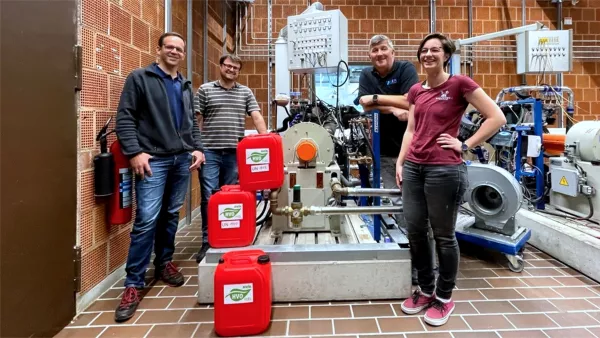
In the vehicle technology laboratory of the Faculty of Mechanical Engineering, all diesel-powered drives are currently being converted to the diesel substitute fuel HVO 100, which was recently released for sale. The advantage of HVO lies in its high energy density. Hydrogenated biogenic waste oils and fats from AVIA are used, which, according to the manufacturer, are free of palm oil and are produced exclusively from residual materials. This means that the product is not in direct competition with food and animal feed production.
With this innovation, RWU is following regional industrial companies, such as Liebherr, in reducing pollutant and greenhouse gas emissions. Unfortunately, diesel engines cannot currently be replaced in many areas, such as off-road applications in construction, agriculture and forestry as well as in emergency power generation.
According to the manufacturer, the use of HVO 100 produces up to 90% fewer greenhouse gas emissions than the combustion of conventional fossil diesel fuel. Other positive effects in terms of air pollution control are the lower levels of NOx emissions and fine dust particles compared to fossil diesel. This was established in a series of tests with HVO 100 as a substitute fuel.
Nevertheless, this alternative fuel is not a complete solution for all forms of mobility. HVO 100 can only be produced in limited quantities as a sustainable substitute fuel, as the initial quantities of the necessary vegetable waste oils and fats are also small. A complete conversion of the diesel-powered transport sectors does not appear feasible due to the huge quantities of fuel required.
If huge quantities of fresh vegetable oil or fat were used as an alternative, this would create competition with food production. In addition, it must always be questioned how HVO 100 is produced: If the required fats are not waste products or residual materials and may be shipped over long transportation routes, it cannot be assumed that they will have a positive effect in terms of ecological sustainability.
"With this alternative fuel, we are delighted to have been given an opportunity to make our contribution to greater environmental protection and sustainability at RWU," says Professor Dr. Robert Bjekovic from the Faculty of Mechanical Engineering.